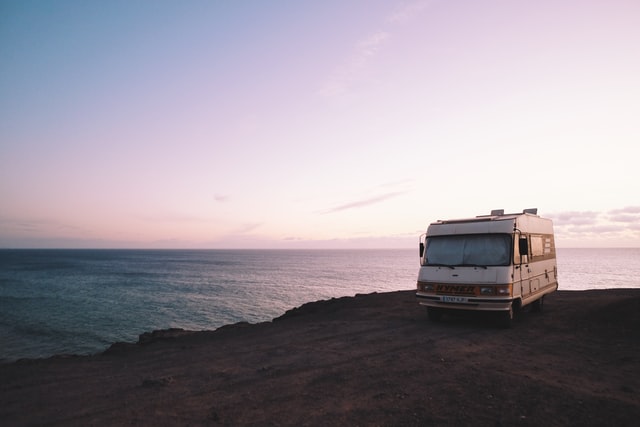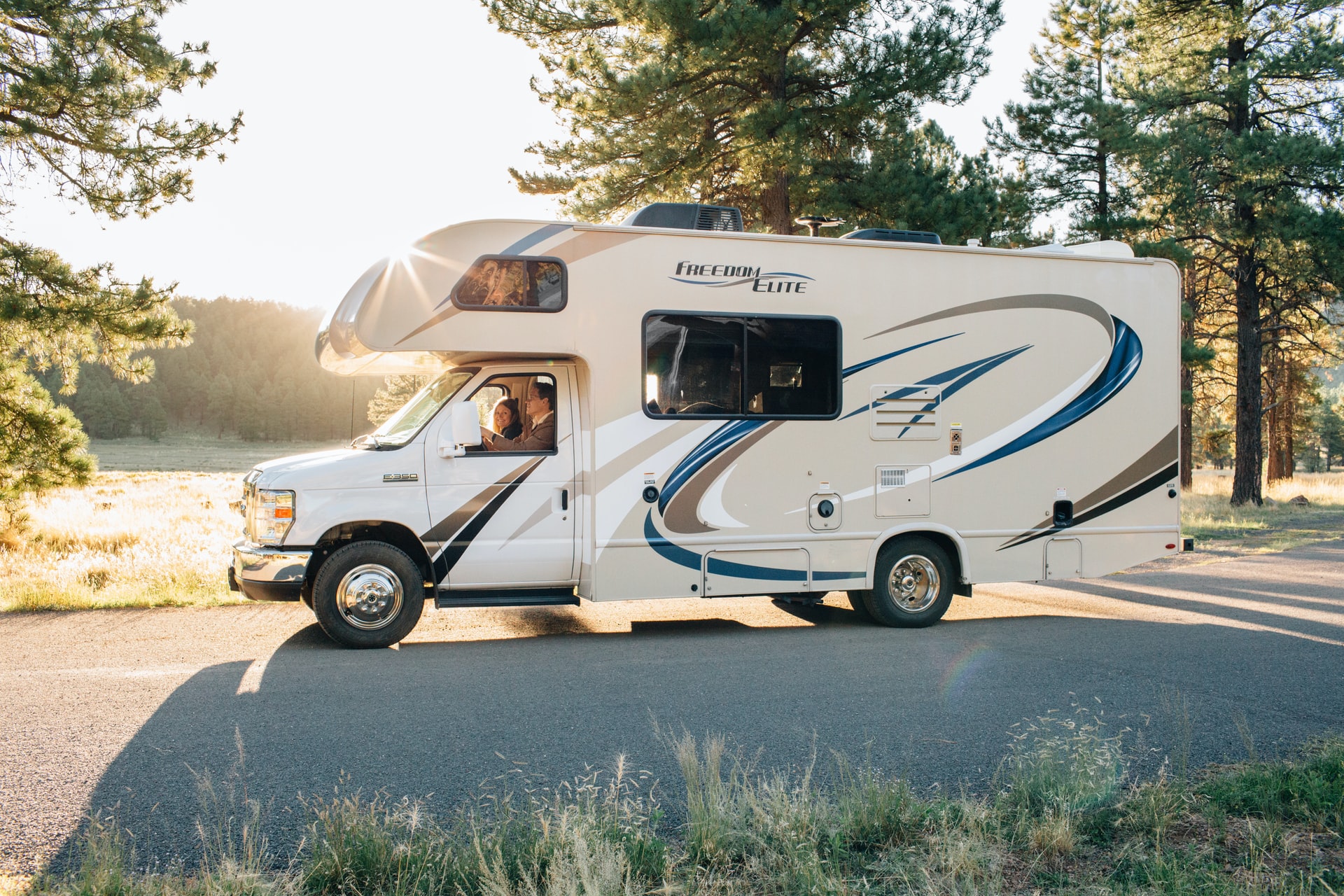Traveling in the comfort of our home can be possible when done right.
When it comes to creating a home, a house on wheels can be an option for the ones with restless feet and a love for the open road. Fitting a futon chair into an RV might not be feasible, nevertheless, you can create a fantastic cozy environment that you can take on the road. It can also be a great alternative for those looking to save some money.
Nowadays, with the possibility of working online and advancements in technology, you can pretty much live anywhere you want to without sacrificing the comforts of modern technology.
In this Q&A with the experts, we’ve set out to know more about alternative housing, from shipping containers and boats to RVs and camper vans, as well as how to make make it extra cozy with alternative energy.
We’ve created two articles about what these experts have to say, this one is focused solely on RVs, you can find out more on other types of alternative housing here.
Please keep reading to discover what they have to say.

What’s the biggest challenge when it comes to making an RV a comfortable place to spend long periods of time? How did you solve it?
What are some practical tips when traveling or living in an RV during the winter?
When we were camping in Breckenridge during January, we laid carpet tiles down on the floor with double-sided tape. This buffered the cold floor for our feet and was easily taken up when we moved on. We also set up a small individual space heater in the bathroom with a timer so it would come on about an hour before we got up. If there was a freeze alert, we would leave it on all night with the cabinets open. These same heaters were placed in our outside bins with the tanks so they did not freeze. While they didn’t put out a lot of heat, it was perfect for those small spaces.
Debra Benton | The Virtual Campground
What are big benefits of living in an RV that are many times overlooked?
- You accumulate less stuff than in a brick-and-mortar home.
- You never have to pack to go on a vacation and your favorite cookware can come with you, too!
- Your front porch can always have amazing views, especially if you’re parked at a Harvest Hosts location (which includes alpaca farms, sprawling vineyards, airplane museums, and so much more).
- Depending on the size of your RV, it can take 30 minutes or less to clean. Hello, more time for fun!
- You always get to sleep in your bed and have your own space. No more sleeping in weird guest bedrooms with a shared bathroom!
Alyssa Javadi | Harvest Hosts
What’s the maintenance like for an RV? Is it expensive? How do you compare it to a normal house?
What are some valuable tips to prepare to live the RV life full-time?
Turn to social media with dreams of traveling full-time in an RV, and you may get lots of support and cheers with comments like, “Just do it! You’ll love it.” While you might love it, “just doing it” may quickly turn your dreams into a nightmare. Our best advice for anyone preparing for the full-time RVing lifestyle is to create a detailed plan and budget. Most important in that plan is to travel debt-free, and have established income to cover your travel expenses and emergencies. We learned early on that the best way to support our nomadic lifestyle was to develop multiple revenue streams. After 15+ years of living and working on the road, we must be doing something right.
Jim & Rene Nelson | LiveWorkDream
How can you maintain a sense of community and social interaction while living the RV lifestyle?
Living in an RV is all about freedom and adventure, but it can get lonely if you’re not intentional about building a community on the road. Luckily, there are practical ways to stay connected with others and enjoy social interactions while living the RV lifestyle.
One big thing is to use social media and online RV forums. Platforms like Facebook groups and RV-specific apps are where people share their experiences and tips. It’s a great way to meet fellow RVers, get advice, and even plan meetups. There are many different active RV-related groups on Facebook.
Going to RV events and gatherings is another solid move. These events, like the RV Entrepreneur Summit or Xscapers Convergence, are perfect for meeting people face-to-face, hearing their stories, and making friends. I’ve been a member of Xscapers since I started RVing and I met tons of friends by going to events.
Building connections in campgrounds and RV parks is key. Strike up conversations with neighbors, join in on communal activities, or organize potluck dinners. Many parks also host events like game nights or BBQs that create a friendly atmosphere.
If you have time, volunteering while you travel is a cool way to connect with local communities. Pitching in on local projects or joining volunteer groups not only helps others but also introduces you to like-minded people.
Staying in touch with friends and family is important too. Technology is a blessing for this. Video calls, social media updates, and online games are simple ways to bridge the distance and keep those connections strong.
In a nutshell, making friends while RVing is about a mix of online and real-world interactions. Use social media and forums to find like-minded folks, attend events to meet people in person, and get involved in the communities you come across. By doing this, you’ll turn your RV journey into a social adventure with a bunch of great connections.
Viktoria | Small RV Lifestyle
What are some important modifications or adjustments that can greatly improve the living functionality in a Camper or RV?
Whether your RV is new or old there is always a scope for some modifications or adjustments. All these modifications or adjustments will improve your living functionality in your Camper or RV. Below are some of the upgrades that every RVer should think of adding to their RV. All these upgrades or adjustments will not make your RV trip easier but also make your travel safer.
- Faucet
- Water-saving aerator
- RV shower head
- RV suspension upgrades like sumo springs, equalizers, shackles, and wet bolts
- Steering stabilizers
- If you have an older RV upgrade them with new LED lights
- Upgrade for entertainment like smart TV, speakers, etc
- Upgrade your old RV AC
- Surge protectors
- Solar power
- Lithium batteries
- Shoe storage
- Mobile spice racks in the kitchen
- RV GPS
- Coffee maker
- Dehumidifiers
Asen Qvorov | Camper Life
Which are your top three tips to save money living in an RV?
When is an RV too old? What are some handy tips for someone who is buying second-hand?
With all the refurbished and classic vintage vehicles around, how old is too old for a used RV is more just a number and you should really be asking yourself how used is too used? While we agree that age can be an important factor it might not be the most important thing to consider. Listed below are some tips to think about before you purchase a used RV or travel trailer:
The 10-Year Rule
If an RV is over 10 years old, it is possible that you will run into issues staying at certain RV parks. While it may not be true all of the time, the rule assumes that an RV over 10 years old could be weathered looking and not acceptable at some parks. If you plan on staying at many RV parks with your used vehicle, it is something to consider when purchasing an older RV.
How well did the previous owner maintain the vehicle?
The 10-year rule aside, what really makes an RV too old is more about the condition than the actual age of the vehicle. It stands to reason that a vehicle that is 10 to 20 years old but well maintained can make a better investment than a newer vehicle that has been abused. Just like buying a used car, ask to see the maintenance records of the used RV. If the seller has great records, you will see regular maintenance performed and it indicates they have been responsible with their RV. Lack of records makes it difficult to verify if important service has been performed on the vehicle during its life and could be an indication that the seller has not been that fastidious with the vehicle’s upkeep. Again, like a used car, consider hiring a professional to check out the vehicle before purchasing. They will be able to spot any potential issues that may come up after you have bought it.
How often was it used?
A typical RV owner does not travel that much in a year. Maybe three or four times at most in one year. This equates to low mileage on a used RV of around 4,500 miles per year on average. The mileage on the used vehicle will speak volumes to the wear and tear it has encountered during its life with the seller.
RV Storage Method
Lastly, the method of storage that was used for the RV is important to consider. Since the vehicle will typically spend more time idle than in use, where and how it is stored can significantly affect the overall condition of the vehicle. Ideally, it was stored somewhere covered or in an enclosure of some sort. A vehicle stored properly like this will last much longer and hold more of its value.
Steve Reed | Carefree Covered RV Storage
What should people consider when traveling in an RV with pets and children? How can they make it extra comfy for them?
There are a variety of different RV washing machines available and I totally recommend making sure your RV has one onboard. They are generally a smaller machine (around 3.5kg), so you’ll find that you may need to do loads more frequently. If you’ve got solar power and an inverter, you’ll be able to power the machine that way, the biggest thing is making sure you’ve always got plenty of water. Laundromats are great for the odd occasion, but they will eat into your budget if you’re using them frequently. If you have an awning on your RV, I’d recommend installing a permanent clothesline for easy drying on laundry days.
Emma Earthwanderer | My Rig Adventures
What is a good way to make RV life affordable?
Many people want to own and travel in an RV but still like having their brick-and-mortar home as well and quite frankly don’t have the income to pay the payments of the RV and the expenses of traveling as well. Many homeowners age 62 and over have found that a reverse mortgage can help them get out on the road while not breaking the bank.
Here’s how. The reverse mortgage has no monthly payments so borrowers can use the funds to purchase their chosen RV and pay no payments while they travel. In many instances, they even have additional funds available to them to help cover their travel expenses while on the road. When those borrowers are done traveling, they can sell the RV and continue to live in the home.
Now there are some things to consider with this plan of action. Firstly, if you want to be a full time RV’er, this doesn’t work for you as you must live in your home for at least 6 months plus one day a year under the terms of the reverse mortgage. You cannot just go out on the road for 3 years as the lender would call your loan due and payable for non-occupancy but if you want to travel for just under half the year, this works well. The RV is a depreciating asset.
If you are depending on the sale of the RV to repay the reverse mortgage in full at the end of your travels, it would not achieve this goal as the RV will depreciate and the loan will accrue interest (increase). However, you will never be required to repay the reverse mortgage as long as you meet the occupancy requirements and you pay your taxes, insurance and any other property charges in a timely manner (i.e., HOA dues if any).
So, the bottom line is that you need to consider your goals and your desires. If it is more important to you to retain your equity to pass on to future generations, this may not be a good choice for you. If your goals are to find a way to get out and see the country and need a way to fund your plans without adding additional payments to your monthly obligations, this is an option for many that you may want to consider.




